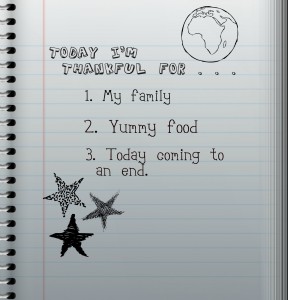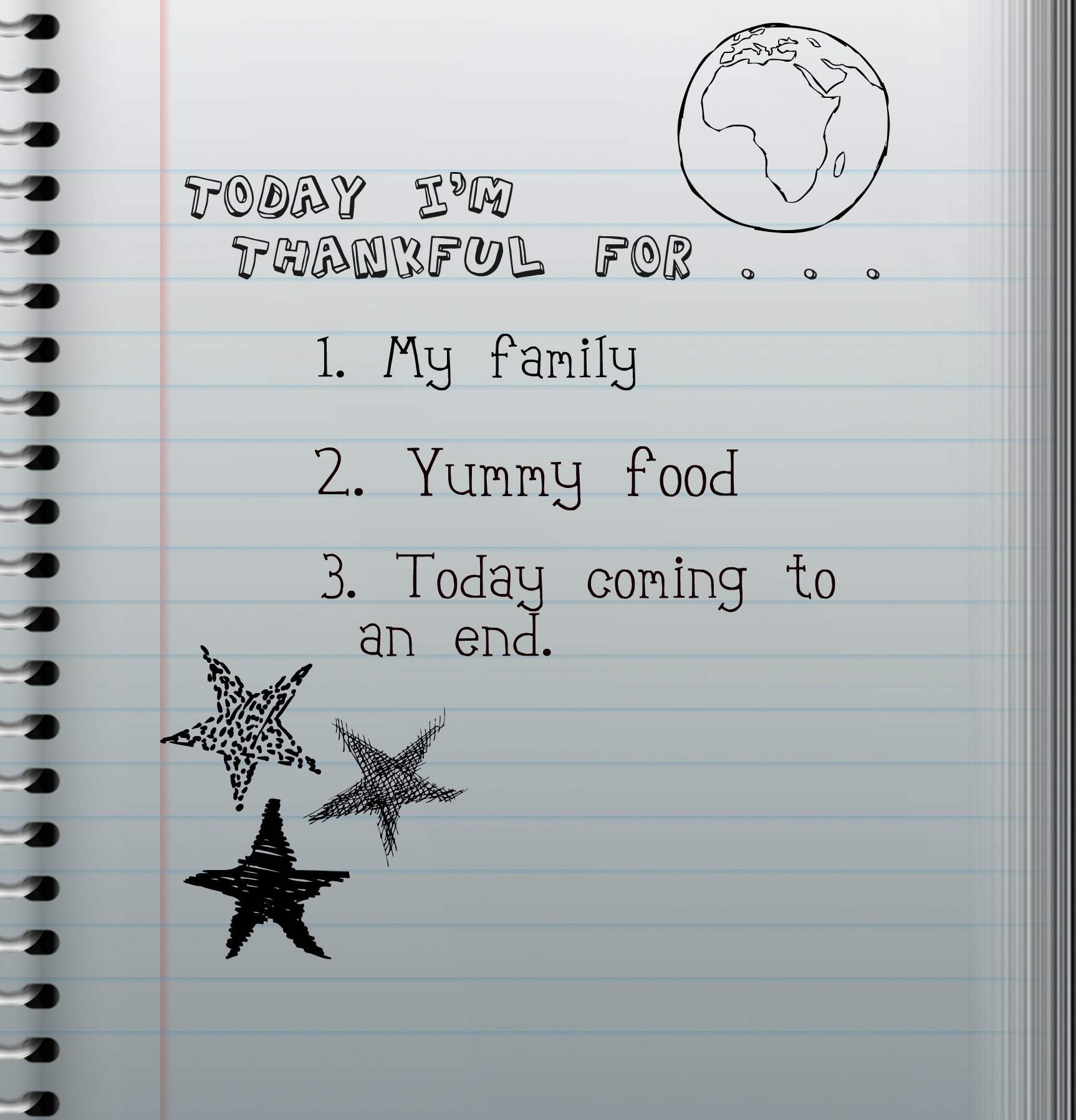 Gratitude seems to be trendy right now. It is the trait buzzing around Christian blogs, but it’s not limited to followers of Christ. Today a money-wise newsletter I read had gratitude listed as it’s number one way to beat unhappiness. It’s interesting to see this virtue get some good press.
Gratitude seems to be trendy right now. It is the trait buzzing around Christian blogs, but it’s not limited to followers of Christ. Today a money-wise newsletter I read had gratitude listed as it’s number one way to beat unhappiness. It’s interesting to see this virtue get some good press.
Nine and a half years ago when my life was upended by civil unrest in Cote d’Ivoire, I returned to the States with a carry-on bag, exhaustion, and a little bit of trauma. My attention span was shot. Reading a few verses from the Bible could take an hour or more. A 30 minute TV program taxed my abilities to focus. My Ministry Director, a very wise man, challenged me to do no more than write down three to five things I was grateful for every day.
As easy as that seems, it proved to be a monumental task a few times. I remember getting to the end of my thankfulness list for the day and concluding, “Thank you, Lord, that today is over.” There were other days when gratitude flowed through my brain, down my arm, out my pen, and onto page after page of my journal. Every day was different.
When I saw my Ministry Director next it was three and a half months after evacuation. We’d talked on the phone a few times, but this was our first face to face in a while. Towards the end of our conversation he said something along the lines of, “You’re so joyful. I don’t think I’ve ever seen you this joyful before. What’s making the difference?” My only answer was that of being intentionally thankful every day.
For most of the last decade I’ve maintained that discipline of gratitude. Some days I sloshed with it. Other days, it was scraping the proverbial bottom of the barrel.
In the last year or so, I’ve lost the habit of intentionality in this discipline. I’m not sure where it happened, but things seem to have sloughed off around my first Achilles surgery. Pain and painkillers may have contributed to the lack of writing. It’s not that I haven’t been thankful in the last 15 months. I simply haven’t been intentional about it.
I’m trying to change. I know I need to change for my own well being. I know I need to change in order to lead well in the coming months. I know I need to set the example for my interns and for the TCKs I will be face to face with all summer.
For those who live in between worlds, it’s easy to lose perspective on the blessings that permeate life. We get too overwhelmed with missing part of one world, that we neglect to recognize the gifts that surround us in the next part of our world. We can even disparage one part of our life in favor of the next.
I want to be a good example of one who is truly thankful. I want gratitude to ooze out of my pores and rub off on those around me. I want to help those in my sphere of influence learn how to ooze even better than I do. My thoughts have been challenged this week about changing lesson plans and creating an atmosphere in my “classroom” that promotes an attitude of gratitude. Ann Voskamp’s blog has some great ideas. I’m open to those and more.
How do you approach gratitude? How do you promote it in others?
image of blank notebook paper courtesy of xymonau on rgbstock.com; words and doodles added from picnik.com which is sadly closing in a few weeks.

5 responses to “Gratitude and Attitude”
This has really blessed me tonight. I pray that I can keep my concentration going long enough to develop the habit of being intentionally grateful. Thankfulness slips away all too easily with the stresses of life.
We get too overwhelmed with missing part of one world, that we neglect to recognize the gifts that surround us in the next part of our world.
This sentence from above totally JUMPED off the page at me. I will be joining you in working on being more intentional about an attitude of gratitude for the blessings I have HERE, even when where I want to be is THERE.
Thanks so much for sharing so honestly and with such clarity. One of the things I have been grateful for over the last 9.5, and more, years is YOU. And that technology lets us keep up with each other even though we have not seen each other nearly enough.
Love you so much!!
Carol, thanks for letting me know that you were here. It humbles me to think that my words were a source of blessing for you. You’re so correct–stress piles up and thankfulness easily slips away. Perhaps intentional gratitude is the antidote.
Judy! I am so thankful that you’re still a part of my life–even though we haven’t lived near each other in so long. I treasure you and your friendship. I’m grateful for the technology that keeps us in touch. As far as the sentence you picked out . . . There has been talk in our world for so long about the kids we work with and their sense of entitlement and how to combat it. Gratitude is the only viable answer I’ve been able to come up with. It goes beyond just saying thank you when it’s appropriate. We have to figure out how to cultivate it in ourselves before we can cultivate it in the kids. We have to model it. It’s a challenge. I’m glad we’re on this journey together.
Soul, This is very encouraging to me. We have so found this principle true in our ministry here. In the spiritual battle, gratitude–daily, regular gratitiude–is one of the best ways to combat the negative thoughts and comments floating around. I find this extends to the people around us. I try to focus on really thanking people, and expressing thankfulness for them to others. I think it really works.
Also, I am sometimes discouraged about my kids’ spiritual walk (see recent prayer letter). But one thing they DO know how to do is to thank God for things, even simple things like getting to play with a friend that day, or having what they like for dinner. At least, Eric’s prayers are chiefly composed of those thank yous. They’re very short, but at least he’s learning to be thankful.
Let me know if you have other ideas along these lines. My kids are awfully entitled too. 🙂
‘ugs and misses,
Soul
It’s amazing what a difference it makes. I’ve already started to plan some simple things to pass on this summer during my plethora of programs. I haven’t seen your prayer letter yet–will go there next. If you’ve taught them gratefulness, you’ve given them a rich heritage. Your kids are TCKs . . . it’s a rare one that doesn’t feel entitled at some point–even in the midst of great loss and grief.